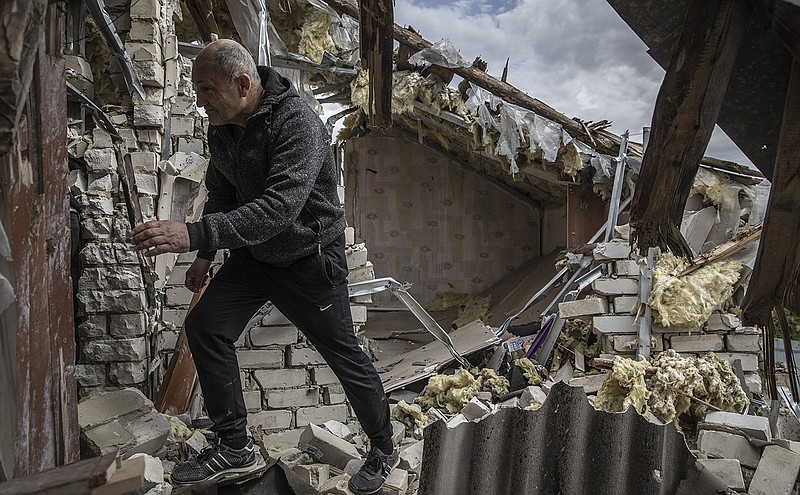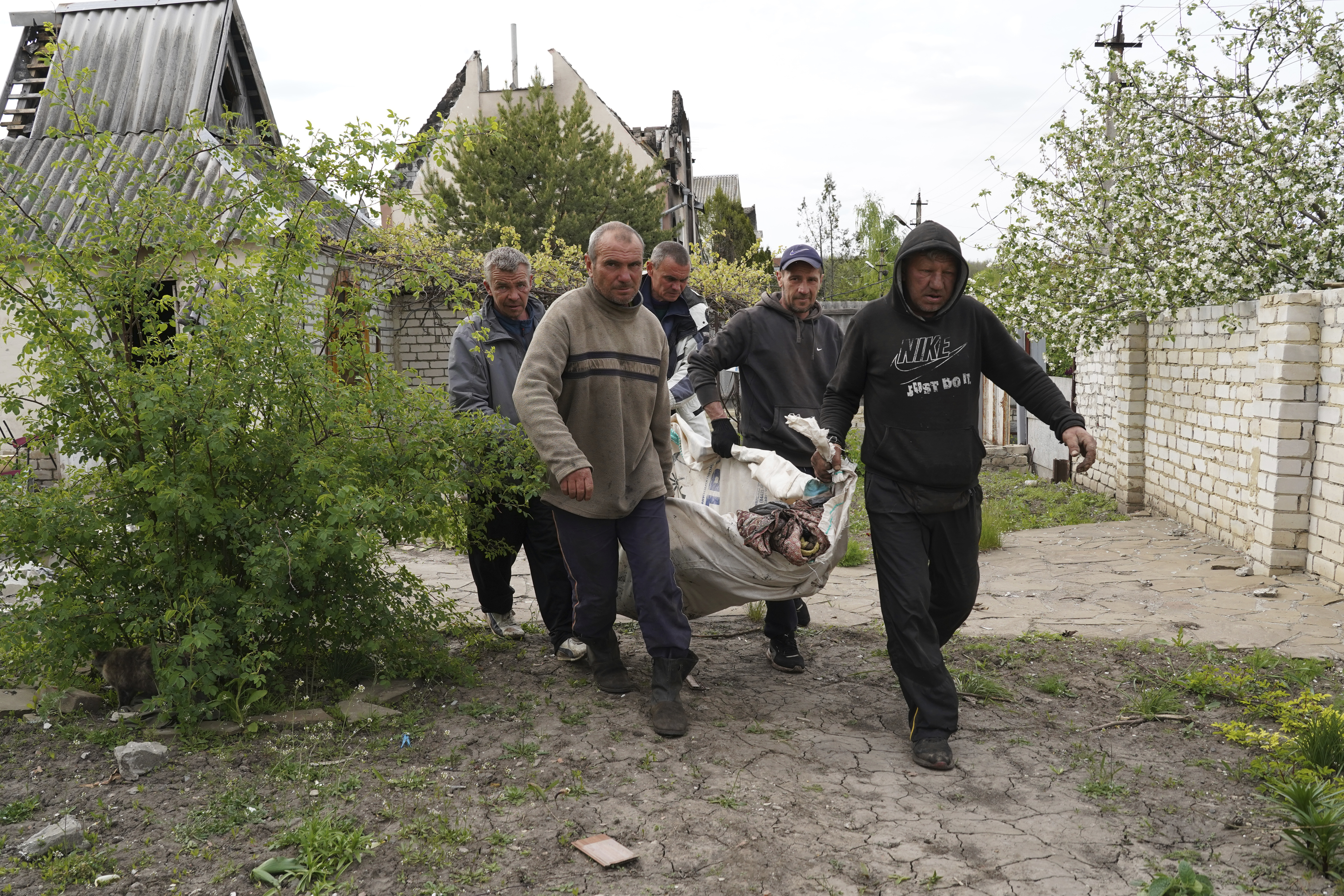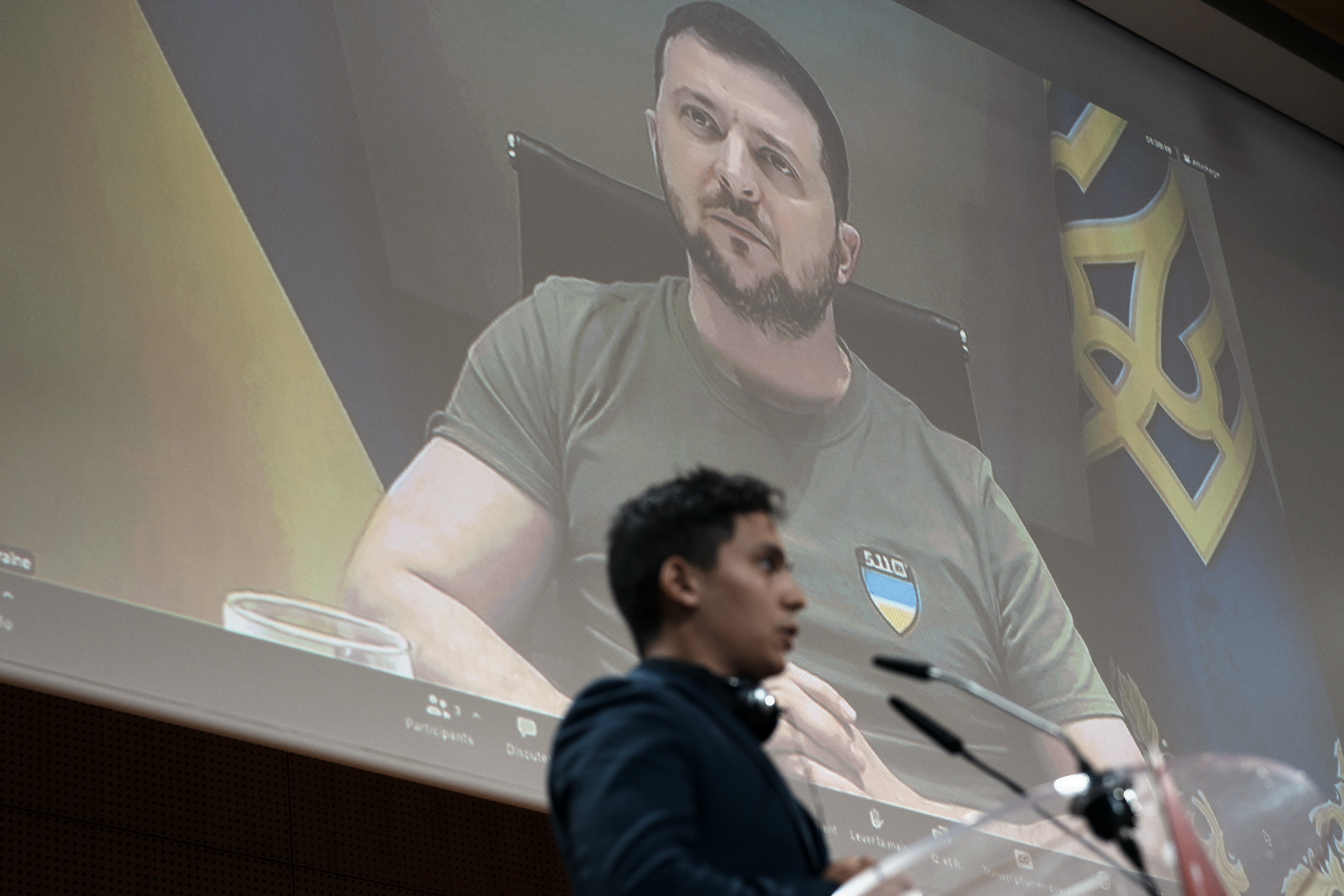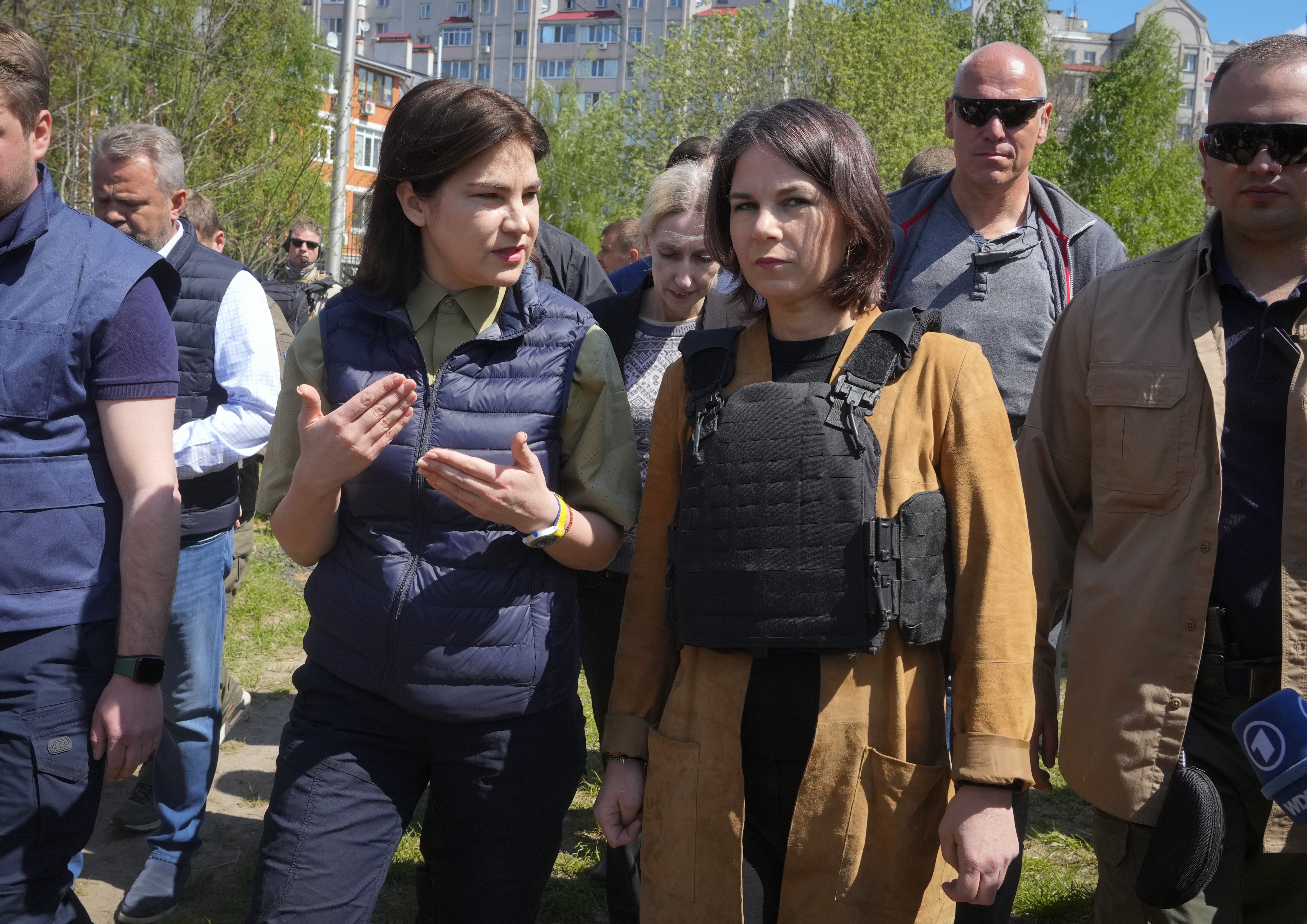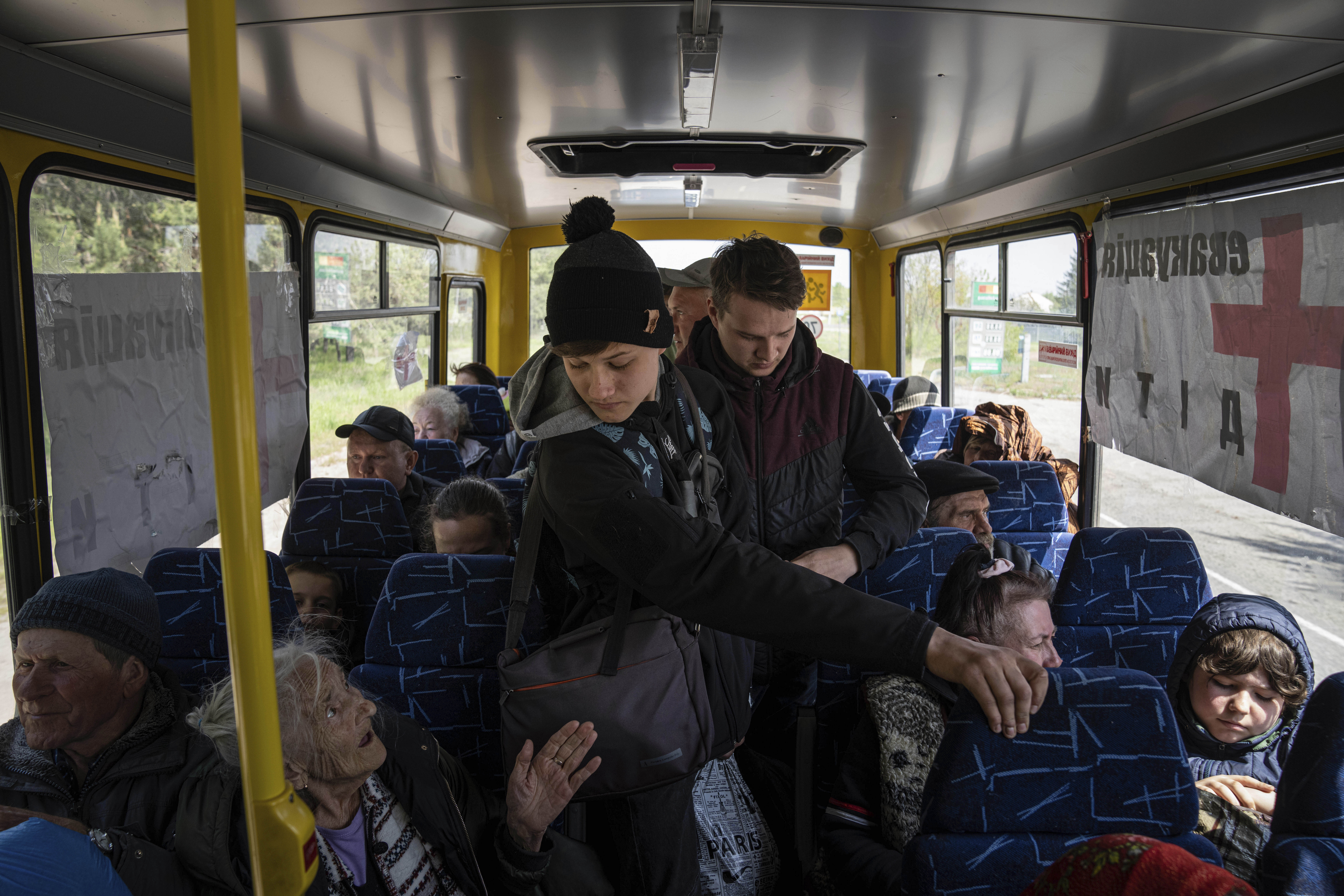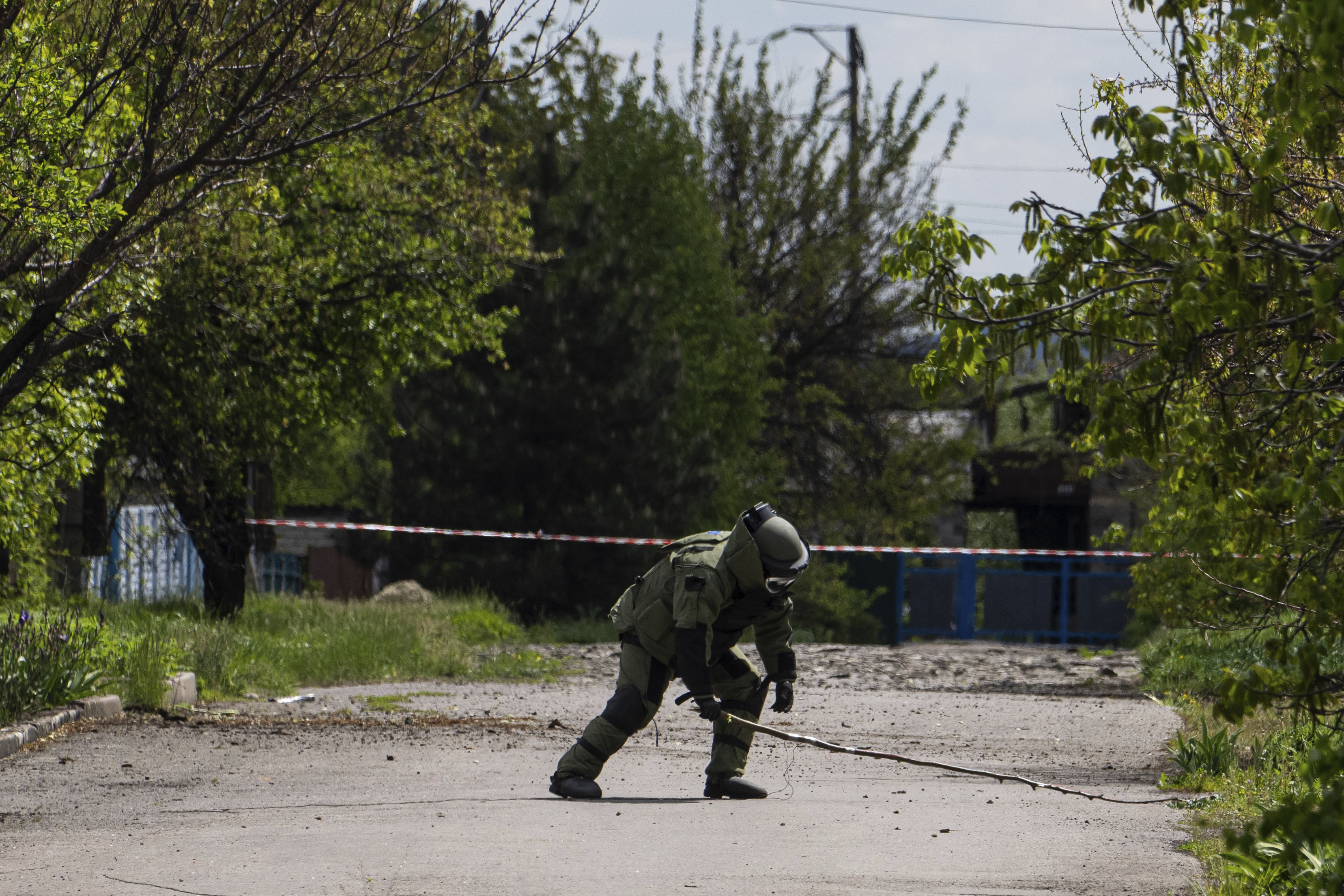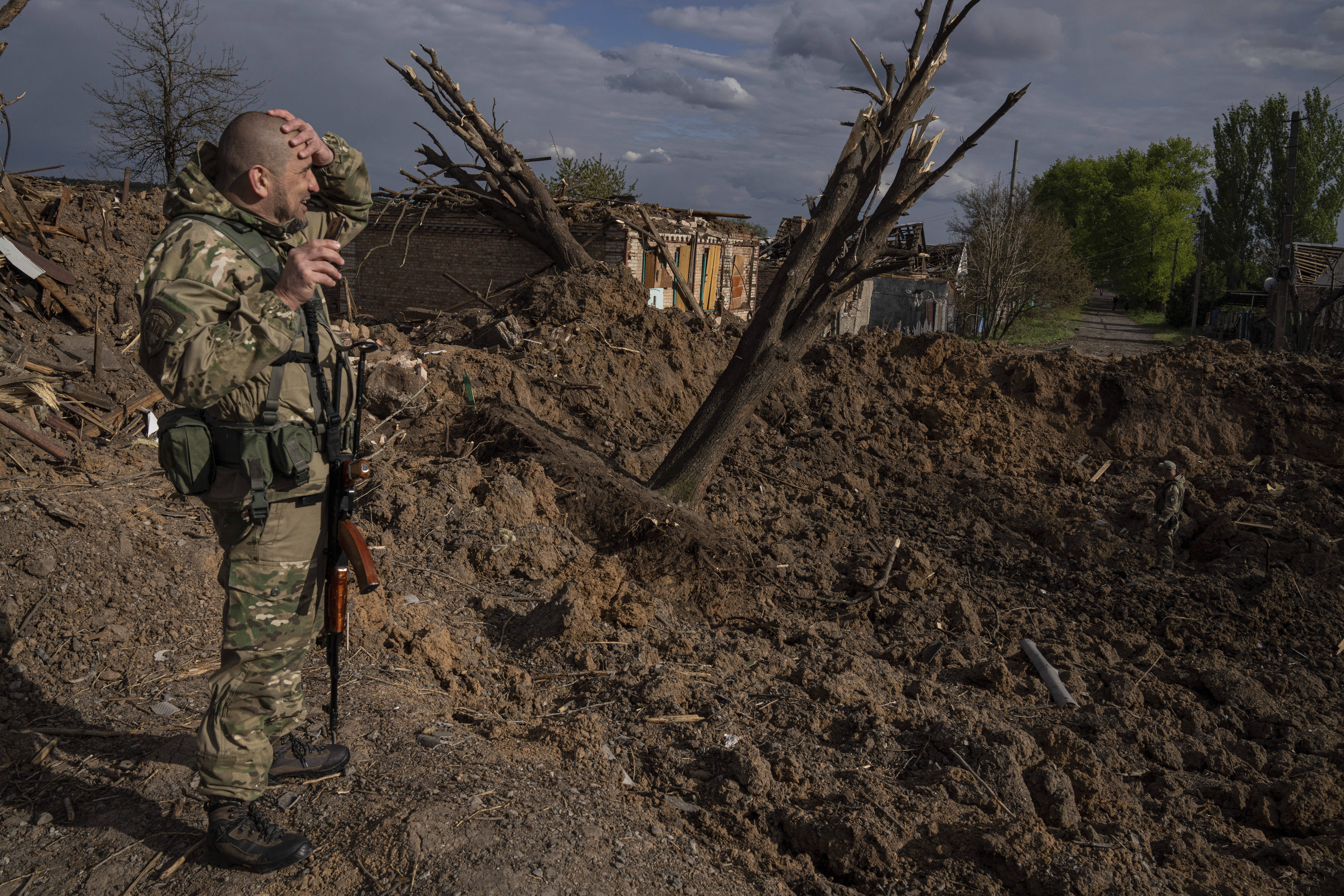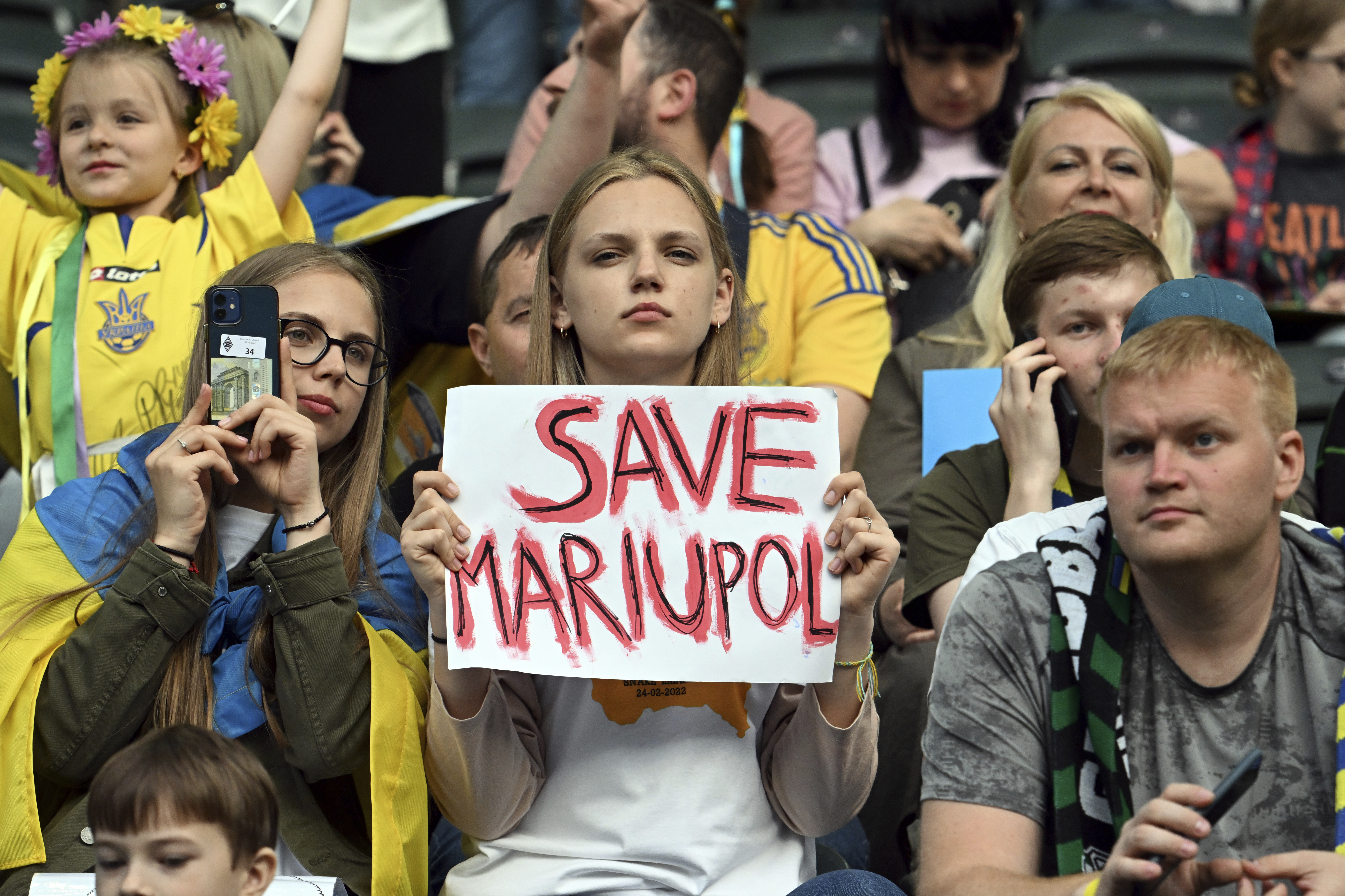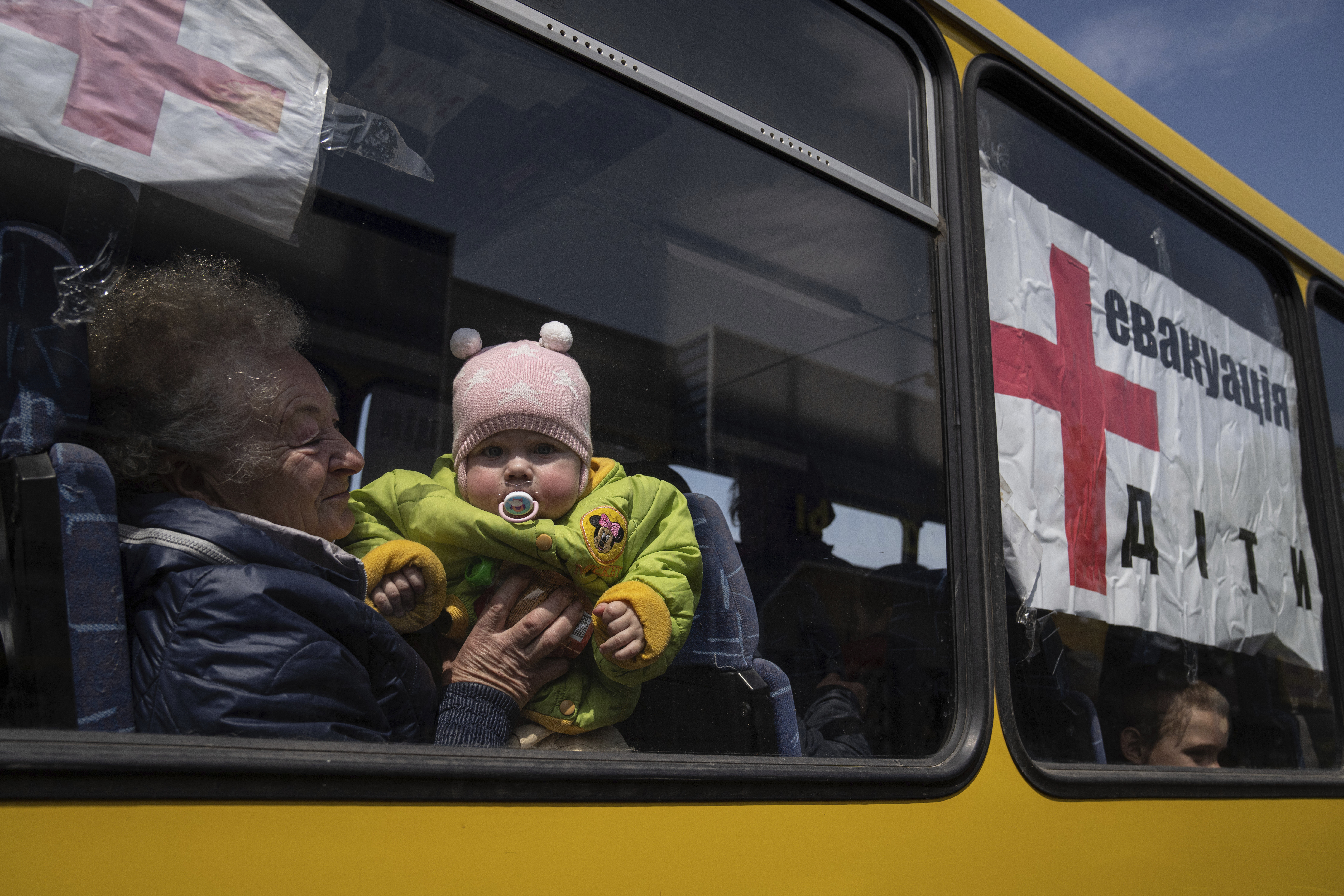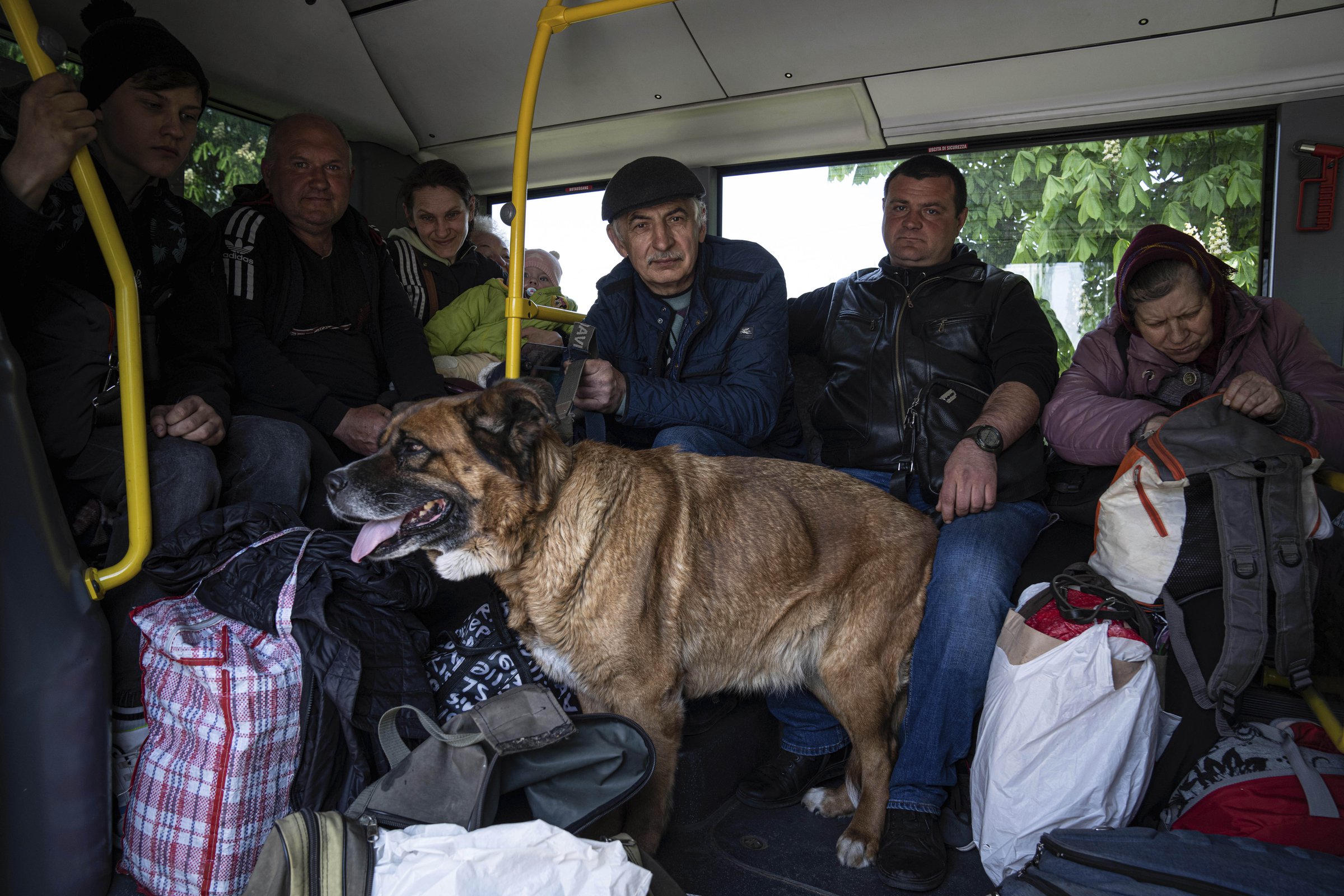ZAPORIZHZHIA, Ukraine -- Ukraine's top prosecutor disclosed plans Wednesday for the first war crimes trial of a captured Russian soldier, as fighting raged in the east and south and the Kremlin left open the possibility of annexing a corner of the country it seized early in the invasion.
Prosecutor General Iryna Venediktova said her office charged Sgt. Vadin Shyshimarin, 21, in the killing of an unarmed 62-year-old civilian who was gunned down while riding a bicycle in February, four days into the war.
Shyshimarin, who served with a tank unit, was accused of firing through a car window on the man in the northeastern village of Chupakhivka. Venediktova did not say when the trial would start.
The prosecutor's office said Ukrainian investigators collected "evidence of his involvement in violation of the laws and customs of war combined with premeditated murder" and that the crime can carry a penalty of 10 to 15 years or life in prison. The statement did not provide details on the nature of the evidence or how the Russian soldier ended up in Ukrainian custody.
"Shyshimarin is actually physically in Ukraine," Venediktova told Ukraine's public broadcaster. "We are starting a trial not in absentia, but rather directly with the person who killed a civilian, and this is a war crime."
A video posted to YouTube by Ukrainian video blogger Volodymyr Zolkin on March 19 appears to show Zolkin interviewing Shyshimarin. Zolkin has become known for his on-camera interviews with Russian prisoners of war in recent months, in which he connects the captured Russians to their families back home.
In the clip, Shyshimarin says that he consents to being filmed, before describing how his unit was told that they would be taking part in military exercises and sent to Voronezh, a city in southwestern Russia about 200 miles from the Ukrainian border, in January. He tells Zolkin he was later captured in Ukraine when his column was surrounded as they tried to take their wounded soldiers back to Russia.
The video shows Shyshimarin calling his father as Zolkin looks on to tell him he had been taken prisoner. "They treat us well here," Shyshimarin says, adding that he expected that there would be eventual talks to organize a prisoner exchange.
"He is just a soldier. I don't think he knew where he was going," the father tells Zolkin about his son. "You say he invaded, and we are told that they were defending the country. He didn't know, he was told to. You hear one thing and we another."
The Washington Post was unable to independently verify the video.
Ukrainian authorities have pushed ahead with efforts to investigate alleged war crimes by Russian forces across the country, even as holding senior officials of a world power to account faces significant hurdles and Kyiv has acknowledged that it might be difficult to bring perpetrators to justice during a war.
There is little international precedent in recent decades for putting captured soldiers on trial for war crimes, and it is even rarer to do so in the middle of a conflict, according to Robert Goldman, a war crimes and human-rights expert at American University's Washington College of Law.
The advantage of holding a trial now rather than at the end of the war, he said, is that access to fresh evidence, including eyewitness testimonies, can bolster a case. "The evidence is very fresh in Ukraine and it's being gathered very professionally, from what I have seen," Goldman said.
"What's going on in Ukraine is really horrific. There are a lot of atrocity crimes, so even though you have to start with the foot soldier who does it, it's better than to have no accountability at all," Goldman said. Trying a string of low-level combatants can also help establish a pattern of unlawful behavior that could implicate senior commanders, he said.
Venediktova's office has said it has been investigating more than 10,700 alleged war crimes committed by Russian forces and has identified over 600 suspects.
Last month, prosecutors filed their first charges, in absentia, in Ukrainian courts against 10 Russian service members they accused of war crimes in Bucha, on the outskirts of Kyiv, where investigators uncovered evidence of torture and mutilation after Russian forces retreated. Moscow has dismissed the accusations.
Two cases are already in court related to the bombardment of civilian infrastructure and houses, Venediktova told the broadcaster.
Ukrainian authorities have the primary responsibility to investigate and prosecute alleged violations of international law committed on Ukrainian territory, experts say, although that requires a functional Ukrainian justice system.
The United States and the European Union are assisting Ukrainian prosecutors, including by providing advice on how to put together a war crimes case and interview prisoners of war.
Prisoners of war cannot be prosecuted simply for taking part in armed conflict, according to the International Committee of the Red Cross and Human Rights Watch. The detaining power may prosecute them for possible war crimes, however. Goldman said it is lawful for Ukrainian prosecutors to try Shyshimarin on these charges.
Volodymyr Yavorskyy of the Center for Civil Liberties said the Ukrainian human-rights group will be closely following Shyshimarin's trial to see if it is fair. "It's very difficult to observe all the rules, norms and neutrality of the court proceedings in wartime," he said.
ANNEXATION CALL
Meanwhile, a Kremlin-installed politician in the southern Kherson region, site of the first major Ukrainian city to fall in the war, said officials there want Russian President Vladimir Putin to make Kherson a "proper region" of Russia -- that is, annex it.
"The city of Kherson is Russia," Kirill Stremousov, deputy head of the Kherson regional administration appointed by Moscow, told Russia's RIA Novosti news agency.
That raised the possibility that the Kremlin would seek to break off another piece of Ukraine. Russia annexed Ukraine's Crimean Peninsula, which borders the Kherson region, after a disputed referendum in 2014, a move denounced as illegal and rejected by most of the international community.
Kherson, a Black Sea port of roughly 300,000, provides Crimea with access to fresh water and is seen as gateway to wider Russian control over southern Ukraine.
Kremlin spokesman Dmitry Peskov said it would be "up to the residents of the Kherson region after all to decide whether such an appeal should be made or not." He said any move to annex territory would have to be closely evaluated by legal experts to make sure it is "absolutely legitimate, as it was with Crimea."
Ukrainian presidential adviser Mykhailo Podolyak mocked the notion of Kherson's annexation, tweeting: "The invaders may ask to join even Mars or Jupiter. The Ukrainian army will liberate Kherson, no matter what games with words they play."
Inside Kherson, people have taken to the streets to decry the Russian occupation. But a teacher who gave only her first name, Olga, for fear of Russian retaliation said such protests are impossible now because Moscow's troops "kidnapped activists and citizens simply for wearing Ukrainian colors or ribbons." She said "people are scared of talking openly outside their homes" and "everyone walks on the street quickly."
"All people in Kherson are waiting for our troops to come as soon as possible," she added. "Nobody wants to live in Russia or join Russia."
On the battlefield, Ukrainian officials said a Russian rocket attack targeted an area around Zaporizhzhia, destroying unspecified infrastructure. There were no immediate reports of casualties. The southeastern city has been a refuge for civilians fleeing the devastated port city of Mariupol.
Russian forces continued to pound the steel plant that is the last bastion of Ukrainian resistance in Mariupol, its defenders said. The Azov Regiment said on social media that Russian forces carried out 38 airstrikes in the previous 24 hours on the grounds of the Azovstal steelworks.
The plant has sheltered hundreds of Ukrainian troops and civilians during a monthslong siege.
Ukrainian Deputy Prime Minister Iryna Vereshchuk said Ukraine has offered to release Russian prisoners of war if Russia will allow the badly injured fighters to be evacuated.
An adviser to the Mariupol mayor said Russian forces have blocked all evacuation routes out of the city. Petro Andriushchenko said there are few apartment buildings fit to live in and little food or drinking water. He said some remaining residents are cooperating with occupying Russian forces in exchange for food.
Ukrainian President Volodymyr Zelenskyy suggested Tuesday that Ukraine's military is gradually pushing Russian troops away from Kharkiv, the country's second-largest city and a key to Russia's offensive in the Donbas, the eastern industrial region whose capture the Kremlin says is its main objective.
Ukraine is also targeting Russian air defenses and resupply vessels on Snake Island in the Black Sea in an effort to disrupt Moscow's efforts to expand its control over the coastline, according to the British Ministry of Defense.
Separately, Ukraine said it shot down a cruise missile targeting the Black Sea port city of Odesa.
Elsewhere, the governor of a Russian region near Ukraine said at least one civilian was killed and six wounded by Ukrainian shelling in the village of Solokhi, near the border. Belgorod Gov. Vyacheslav Gladkov's account couldn't be independently verified, but he said the village will be evacuated.
On the economic front, Ukraine's natural gas pipeline operator said it moved to stop the flow of Russian gas through a compressor station in part of eastern Ukraine controlled by Moscow-backed separatists because enemy forces were interfering with the station's operation and siphoning off gas.
The hub handles about one-third of Russian gas passing through Ukraine to Western Europe. But analysts said much of the gas can be redirected through another pipeline from Russia that crosses Ukraine, and there were indications that was happening.
It was not clear whether Russia would take any immediate hit, since it has long-term contracts and other ways of transporting gas.
Still, the cutoff underscored the broader risk to gas supplies from the war.
"Yesterday's decision is a small preview of what might happen if gas installations are hit by live fire and face the risk of extended downtimes," said gas analyst Zongqiang Luo at Rystad Energy.
HUNGARY HARSHENS TONE
Meanwhile, Hungary hardened its public stance against a European Union embargo on Russian oil imports, saying it would withdraw its veto threat only if its imports via pipelines are excluded.
With a majority of Hungary's crude supplies arriving via pipeline, the comments on Wednesday from Foreign Minister Peter Szijjarto indicated a round of negotiations to cajole Prime Minister Viktor Orban to lift his opposition to the proposed ban had failed.
Szijjarto said European Commission President Ursula von der Leyen's trip to Budapest on Monday to meet Orban and a call to the Hungarian leader by French President Emmanuel Macron on energy security a day later had done nothing to break the impasse.
"These talks made it clear to us that Brussels, or the European Commission, doesn't have a proposal that would deal with the nuclear-bomb effect that an oil embargo against Russia would have on the Hungarian economy," Szijjarto said. "If Brussels is serious about introducing this embargo, then that's only possible if shipments via pipelines are excluded."
EU foreign ministers are scheduled to meet on Monday in Brussels, where they would likely discuss the sanctions plan if a deal isn't reached before then.
It wasn't immediately clear whether Hungary, which cultivated close ties with Putin before he invaded Ukraine, was asking the EU to exclude all pipeline imports from Russia or only Hungary's share. Earlier, the government in Budapest had asked for a permanent exemption for its crude imports via pipelines.
Landlocked Hungary would need billions of dollars to overhaul refineries that now process Russian crude, to expand pipeline capacity from Croatia's Adriatic coast, and for investments in other areas to wean Hungary off of Russian energy supplies, Szijjarto said. He said the best way forward was for EU sanctions to only target Russian crude imports via tankers.
While Hungary has a chance of securing further concessions, it must tread carefully to make sure its hardball tactics don't backfire, according to Kaspar Hense, a portfolio manager who helps manage $20 billion at Bluebay Asset Management.
If Hungary can't be convinced to eventually give up its veto threat, then there's a "high likelihood" that the rest of the EU could ultimately decide to voluntarily go ahead with the Russian oil embargo, marginalizing Orban and depriving the country of significant funding for its energy industry.
"Hungary is being somewhat short-sighted by just looking at the short-term repercussions of the oil sanctions and not seeing that this has more legs on the EU funding side," Hense said, referring to bloc's the energy-security package. "It'd be a pity for countries to miss out on that."
Information for this article was contributed by Elena Becatoros, Jon Gambrell, Yesica Fisch, David Keyton, Yuras Karmanau, Mstyslav Chernov, Lolita C. Baldor, Kelvin Chan and staff mebers of The Associated Press; by Robyn Dixon, Ellen Francis, Annabelle Chapman, Claire Parker and Amar Nadhir of The Washington Post; and by Zoltan Simon and Marton Kasnyik of Bloomberg News (WPNS).
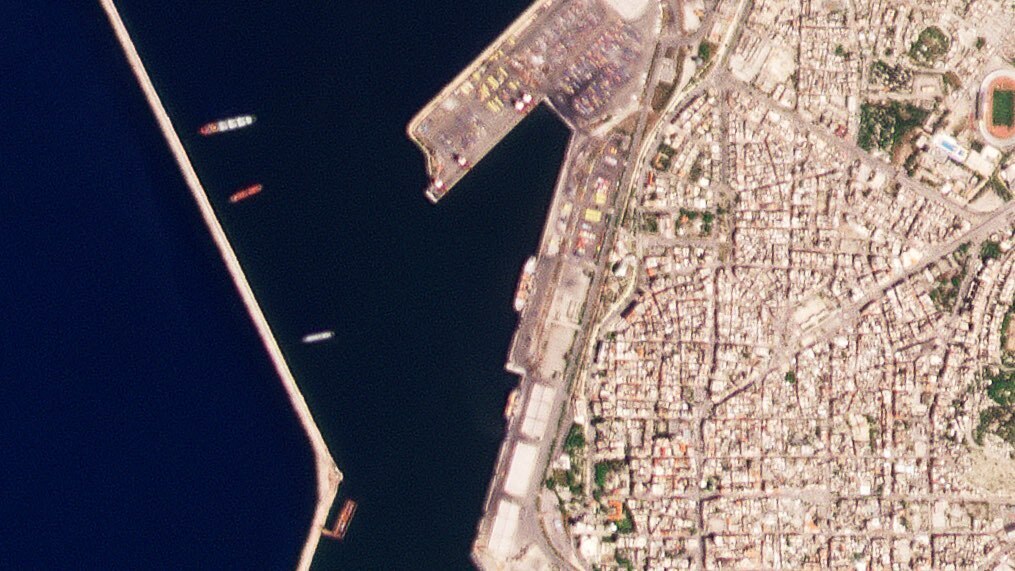 This satellite image from Planet Labs PBC shows the Russian-flagged ship Matros Pozynich, center, inside the harbor of Latakia, Syria, Tuesday, May 10, 2022. Satellite photos analyzed by The Associated Press on Wednesday showed the Russian ship believed to be carrying stolen Ukrainian grain in Latakia, Syria. (Planet Labs PBC via AP)
This satellite image from Planet Labs PBC shows the Russian-flagged ship Matros Pozynich, center, inside the harbor of Latakia, Syria, Tuesday, May 10, 2022. Satellite photos analyzed by The Associated Press on Wednesday showed the Russian ship believed to be carrying stolen Ukrainian grain in Latakia, Syria. (Planet Labs PBC via AP)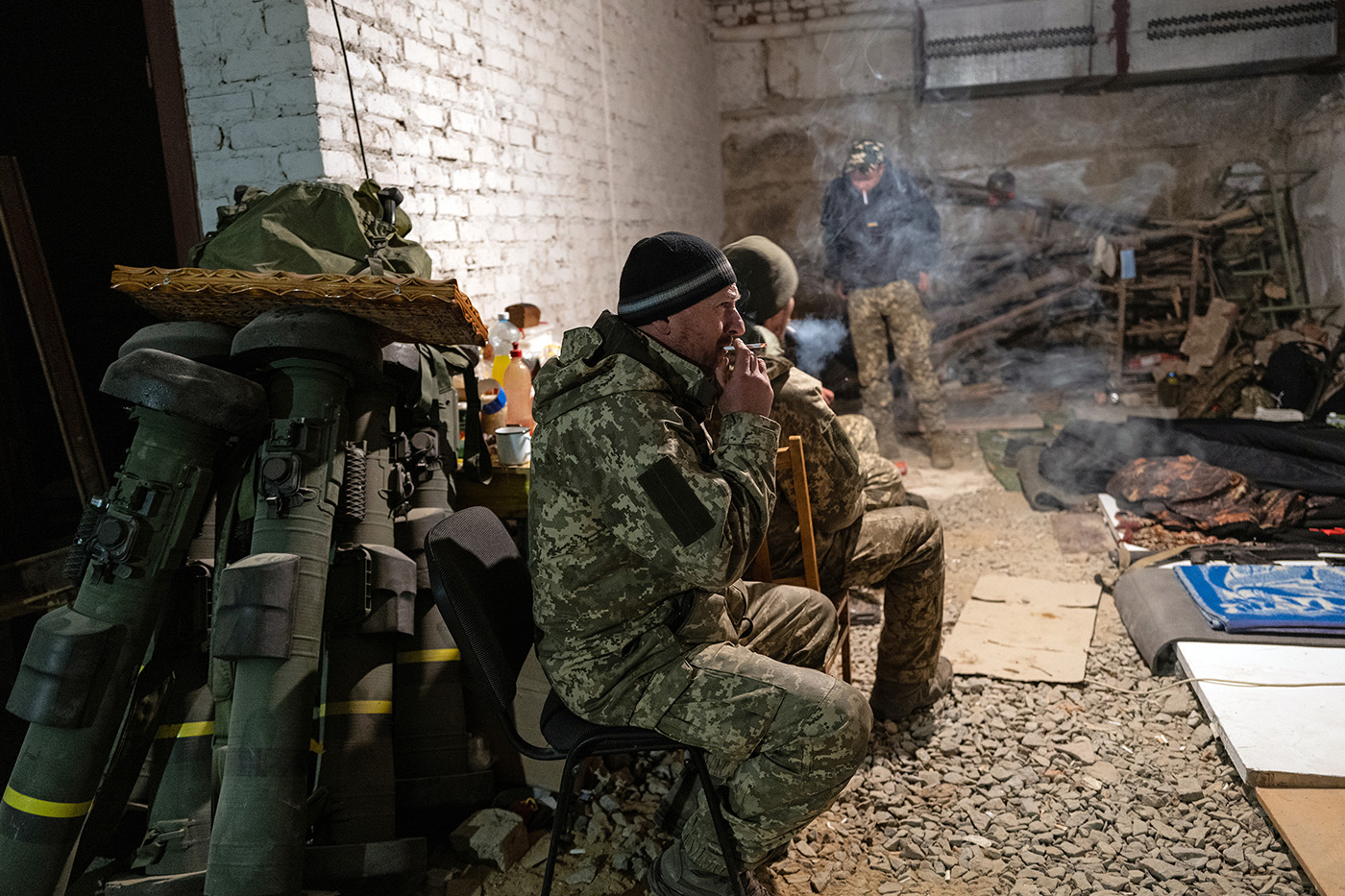 Soldiers of the Ukrainian Army’s Carpathian Sich Battalion smoke cigarettes Wednesday at an underground base in the Kharkiv region of Ukraine while they wait for artillery fire on their position to subside. The volunteer unit is deployed along a line of villages and trenched farmland in the Kharkiv region, tasked with holding back Russian forces pushing down from their stronghold in the occupied Ukrainian city of Izium. (The New York Times/Lynsey Addario)
Soldiers of the Ukrainian Army’s Carpathian Sich Battalion smoke cigarettes Wednesday at an underground base in the Kharkiv region of Ukraine while they wait for artillery fire on their position to subside. The volunteer unit is deployed along a line of villages and trenched farmland in the Kharkiv region, tasked with holding back Russian forces pushing down from their stronghold in the occupied Ukrainian city of Izium. (The New York Times/Lynsey Addario)